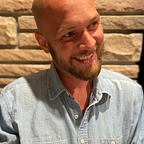Vaccines: Or, What Happened to Our Shared Humanity?
Family dinners were nightly in my childhood home, and my mother inevitably prepared a beautiful spread. We were fortunate enough to feast almost nightly on steamed vegetables, elegant salads, baked potatoes, fresh fruit, and more, but our favorite part was always the meat — braised chicken, roast beef, fried bacon, we lived for it. The only problem was that my mother, being a healthy and wise woman, would typically prepare just two or three pieces of meat per person. So every night, with a childish fear of not having enough and a childish desire to have more than my siblings, I would try to sneak an extra piece of meat off the serving plate and hide it under some salad leaf or pile of vegetables.
I was a child: “I understood as a child, I thought as a child; but when I became a man, I put away childish things” (thanks St. Paul). Wisdom from parents and from my own experience taught me that my selfish meat-hogging (no offense to the doomed hogs) was both unnecessary and unkind.
Somehow, that ancient lesson of sharing has been forgotten in the present coronavirus panic. Maybe we never learned it collectively at all. Whatever the reason, the fear that wealthy nations display when they refuse to share their massive vaccine stockpiles reminds me a great deal of my childish meat-hogging.
Where is our acknowledgement of our shared humanity? So what if wealthy nations paid for the lion’s share of vaccine development — wasn’t it with wealth partially earned on the backs of impoverished laborers in the mines of Africa, the factories of Asia, and the farms of Latin America? Every year billions of dollars flow out of businesses operating in those regions and into the hands of owners based in North America and Europe, money which helps pay the bills of our expensive governments and research labs. And more importantly, are we not all brothers and sisters? How long must we persist in this myth that I have no responsibility to someone as long as they are born on the other side of some imaginary line in the sand which was unimaginable just a few centuries ago?
Doctors and nurses treating dying coronavirus patients in hospitals from Brazil to India are going without vaccines. Social workers, delivery drivers, and grocery store clerks in these countries expose themselves to constant danger in order to keep us — humanity — happy and well-fed. And their grandmothers and grandfathers are forced to risk their lives if they want to maintain relationships with fast-growing progeny. Yet halfway across the world, we inhabitants of wealthy nations seem more concerned with forcing healthy Trump fans to get vaccinated than sending doses to nurses who are hourly risking death to treat their patients.
I am a small voice, and there is little I can do to convince Joe Biden and his crew to donate more to the international vaccination effort. But if all of us small voices join together and speak up for our shared humanity, perhaps those whom fate has placed in power might remember it. For despite the hokeyness of the old song, we really are “all in this together.”
